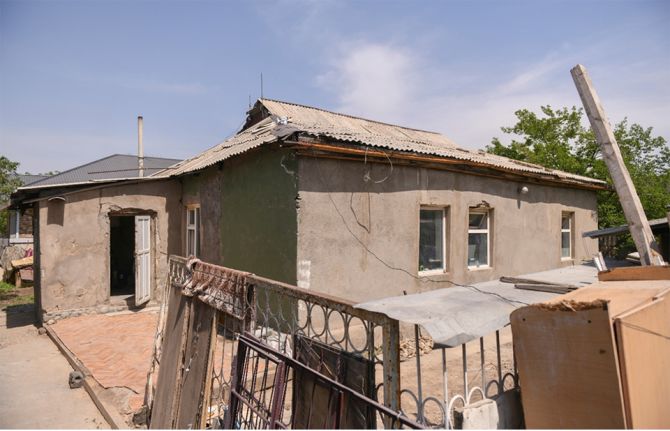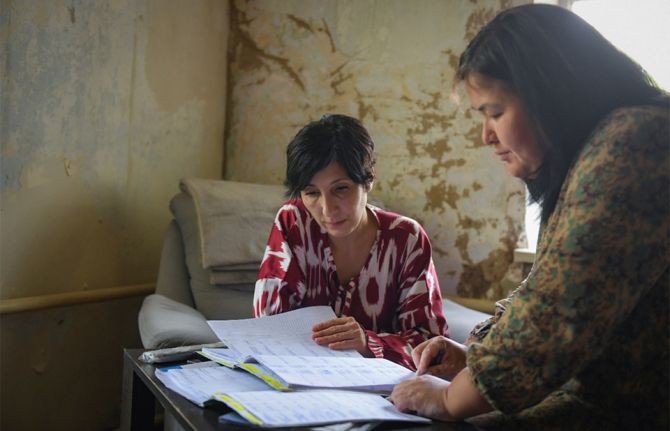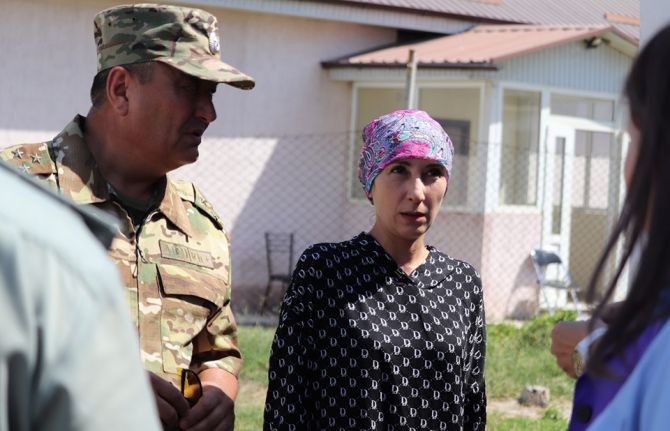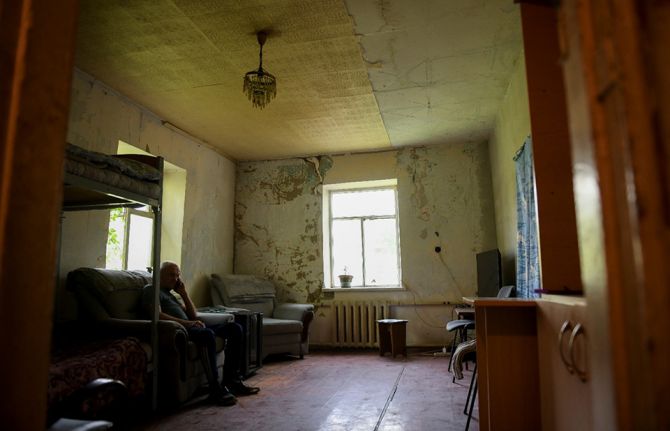




Feature Story
HIV services and social reintegration programmes for prisoners and newly released detainees in Kyrgyzstan at risk of collapse
08 May 2025
08 May 2025 08 May 2025On the outskirts of Bishkek, the capital of Kyrgyzstan, a small house converted into a shelter welcomes people recently released from prison. The shelter is funded by the Global Fund/UNDP project “Effective Control of HIV Infection and Tuberculosis in the Kyrgyz Republic.”
Madina Toktogulova, head of the public foundation Istikhsan, which supports the shelter, is preparing to welcome her clients.
For 25 years, Madina has worked with people in prison, people who use drugs, and those living with HIV and tuberculosis. As a community representative, she was at the forefront of establishing the country’s first grassroots initiatives, self-help groups, and community-based organizations. She played a key role in developing social support and rehabilitation programmes for people in vulnerable situations.
Together with a group of like-minded colleagues, she established the country’s first peer support groups in correctional facilities. They persuaded prison administrations of the importance of providing HIV prevention services, including harm reduction, to people in prisons; they built relationships with prison health professionals, social workers, and psychologists; implemented HIV prevention projects; and helped people newly released from prison who had no place to stay, clothes, or money to return home.
Dr Gulsara Kukanova, a physician at the FSIN hospital-polyclinic in Kyrgyzstan, stressed how vital organizations like Istikhsan are the moment people are released from prison as some stop taking antiretroviral treatment or relapse into drug use. “We partner with organizations like Istikhsan and witness people rebuilding their lives — finding jobs, reuniting with family. Offering hope to someone who has lost it is invaluable.”
Madina knows that without food, shelter, or ID, HIV treatment is not a priority. That’s why she advocates for a comprehensive approach to reintegration.
“People need more than just medical care. They need psychological support, help finding a job, restoring their documents. Non-governmental organizations, with donor support, play this essential role — helping people rediscover themselves,” she explains.
Istikhsan’s work focuses on supporting incarcerated women. Madina says women are more emotionally vulnerable, more affected by violence – the harsh reality of prisons, trauma, stigma, and self-stigma. They are more likely to give up on therapy and lose hope.
“Society forgives men more easily. Women with a prison history are judged more harshly. Maybe because I’m a woman, I feel their pain more deeply,” she says.
The organization is currently providing support to all women living with HIV in a nearby prison. Thanks to their efforts, more than 20 women have been able to restore their identity documents, dozens are receiving psychological and medical support, starting HIV treatment, reconnecting with children, finding jobs, and reintegrating into society.
But all of this is now at risk. HIV prevention efforts built over years through partnerships with government, civil society, and international institutions face collapse due to shrinking funding from key donors, including PEPFAR and the Global Fund.
According to Madina, a systemic approach to reintegration is impossible without cooperation between government institutions and civil society.
“We have a very good probation law that provides a legal framework for supporting people on the path to resocialization. However, as with any system, there are times when resources and human capacity are not sufficient to reach everyone in need. That’s when civil society can step in — in partnership with the state and within the framework of the existing legislation,” she emphasizes.
While the Kyrgyz government fully covers HIV treatment, there’s a real risk that essential social and prevention services — post-release support, reintegration, temporary housing, documentation help, hygiene kits — will be lost without external aid.
“The loss of funding could dismantle the entire support system for women living with HIV in prison. These programmes are not charity; they’re investments in resilient health and social protection systems that can operate independently. Investing now means building a future where everyone’s right to health is protected,” says Meerim Sarybaeva, UNAIDS Country Director in Kyrgyzstan.
“For the first time, we’ve created a model where probation services, prisons, and NGOs collaborate daily, so no one falls through the cracks,” says Chinara Maatkerimova, Programme Officer at UNODC in Kyrgyzstan.
“If we disappear, who will hear them?” Madina asks. But she’s determined to continue — even if it means starting over — to advocate for sustainable funding and rebuild a system where every person, regardless of their past, has a right to health and a future.
As of April 1, 2025, Kyrgyzstan has reported 14,609 cases of HIV. Of these, 61.8% were transmitted sexually and 27.8% through injection drug use. HIV is increasingly being detected among people outside of traditional key populations — a sign of the epidemic’s broader spread in the country.
Region/country
Related
 Women, HIV, and war: a triple burden
Women, HIV, and war: a triple burden

12 September 2025
 Displacement and HIV: doubly vulnerable in Ukraine
Displacement and HIV: doubly vulnerable in Ukraine

11 August 2025

